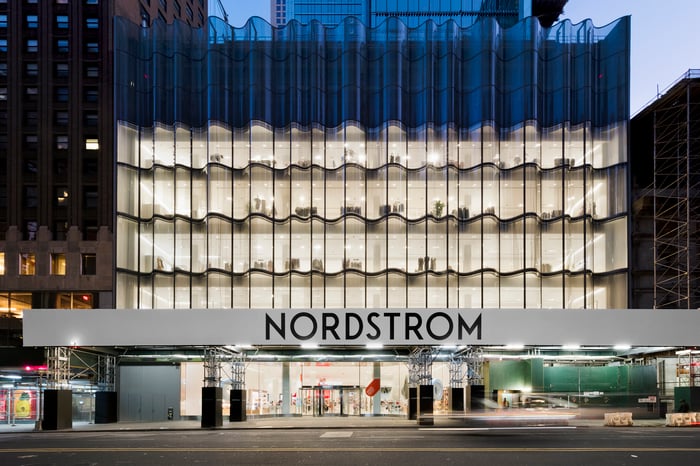The pandemic hit Nordstrom (JWN) harder than most retailers. Its product assortment has historically skewed toward fashion apparel and footwear, but with offices closed and big events like weddings and galas canceled, demand in these merchandise categories plummeted.
Fortunately, Nordstrom entered 2020 with a relatively strong balance sheet, enabling it to survive and continue investing in its business. Many of its rivals weren't so lucky and had to file for bankruptcy and close stores. With the economy starting to reopen in 2021, Nordstrom is moving aggressively to become an even more compelling retail destination, partly by launching a slew of new brand partnerships.

Nordstrom's flagship store in Manhattan. Image source: Nordstrom.
New brands are the norm
Partnering with up-and-coming brands is part of Nordstrom's DNA. As a fashion retailer, the chain can't get complacent about leaning on the same brands to drive its sales year after year. Inevitably, some brands grow stronger over time while others lose their edge. That makes it important to work continuously to identify new brands that can drive growth and replace sales from downward-trending ones.
Nordstrom partners with some brands on a one-off basis for short-term pop-ups. In other cases, the upscale department store has forged long-term partnerships with up-and-coming brands. For example, Nordstrom invested in Bonobos nearly a decade ago and quickly became the start-up's most profitable sales channel, helping to offset losses in Bonobos' e-commerce business.
In recent years, many other digitally native brands -- including upscale luggage brand Away and shapewear brand Skims -- have followed Bonobos' lead by partnering with Nordstrom for a physical retail presence. Now, Nordstrom appears to be doubling down on such partnerships.
Helping young brands reach the next level
In one of the first big new brand launches after the pandemic hit, Nordstrom began selling Casper mattresses at 31 stores and via Nordstrom.com late last year. For Nordstrom, this was significant because it helps diversify the retailer into the fast-growing home market, where it has historically been a minor player. In March, Nordstrom added 50-square-foot displays for Tonal home fitness machines in 40 stores. Like the Casper deal, this partnership gives it a foothold in a new high-growth market.

A Tonal display inside a Nordstrom store. Image source: Nordstrom.
More recently, the company has pivoted back toward a focus on fashion with its new partnerships, as it is seeing a rebound in demand for dressy apparel. Its highest-profile brand launch came just last week, as Nordstrom announced a long-term partnership with Indochino to open custom men's apparel shops in 21 stores, all of which will be open by the end of this week.
Nordstrom has also added several other new apparel and footwear brands in recent months, ranging from emerging designers to niche categories like hijabs. Some of these new brands are permanent additions, while others will be featured temporarily.
Partnerships are the future
Investors should expect to see many more brand introductions at Nordstrom over the next few years. For one thing, the retailer plans to deemphasize the traditional wholesale model under which it buys inventory from brands and has complete control over pricing, merchandising, and inventory management. It will support alternative concession and revenue-sharing arrangements that give brands more control, enabling it to work with those that were reluctant to enter traditional wholesale relationships.
Indeed, at its investor day earlier this year, Nordstrom said it expects "partner owned" and "shared ownership" models to account for 30% of its sales in the future, up from 5% today.
Additionally, many direct-to-consumer brands now recognize that high customer acquisition costs and shipping expenses make it hard to turn profitable while relying wholly on e-commerce. That's increasing their interest in forging retail partnerships. Working with Nordstrom -- the only upscale department store with a national footprint -- makes a ton of sense.
For now, Nordstrom has plenty of work ahead of it just to get back to its pre-pandemic size. But if it can capitalize on its growing appeal as a partner to up-and-coming brands, it could emerge from the pandemic stronger than ever.



